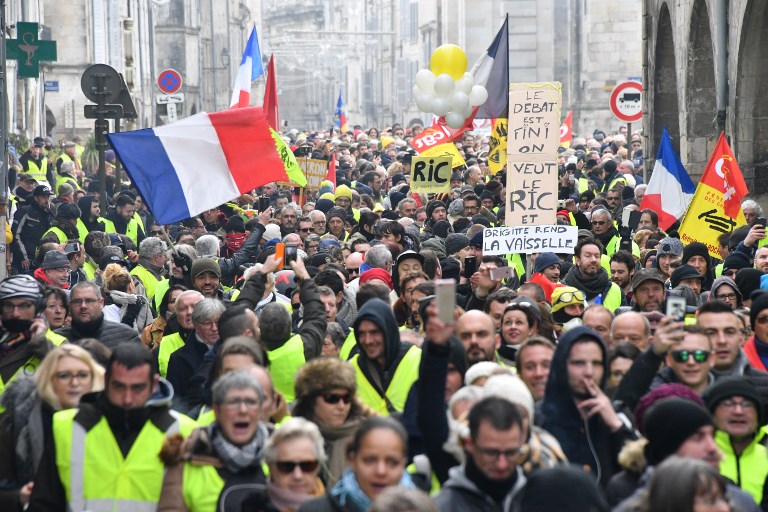

by Clare BYRNE
Agence France Presse
PARIS, France (AFP) — French President Emmanuel Macron faced a battle Monday to convince skeptical French of his latest move to quell “yellow vest” anger as he kickstarted a two-month national debate on his policies.
Struggling to end the biggest crisis of his presidency, Macron on Sunday set out over 30 questions to be debated in towns and villages across the country from January 15 to March 15.
“We won’t agree on everything, that’s normal, that’s democracy. But at least we’ll show we are a people who are not afraid to talk, exchange and debate,” he wrote in his “letter to the French”.
The missive followed a ninth consecutive Saturday of nationwide “yellow vest” rallies which saw an uptick in turnout but less violence than previous demonstrations.
Macron hopes that returning to more participative democracy — a key feature of his 2017 grassroots election campaign — will satisfy protester demands for a greater say in the running of the country.
“I intend to transform anger into solutions,” he wrote, promising “a new contract for the nation”.
‘Extremely grumpy’
In the ranks of the “yellow vests” reactions were mixed, with some welcoming the prospect of dialogue but many calling it a government smoke-screen.
“A debate means discussing everything. When you say we’re going to debate, but not about that, that, that and that… that’s called ‘shut up and listen to me’,” Maxime Nicolle, one of the movement’s most prominent figures, said in a YouTube video.
The leftwing Liberation daily said Monday the debate was an attempt by Macron “to save the three years he has left” as president, but warned that national mood is “extremely grumpy”.
In an Odoxa-Dentsu poll published last week, 32 percent of respondents said they would take part in the debate but 70 percent said they did not believe it would lead to significant change.
The task of organising the public forums has fallen to local government minister Sebastien Lecornu and junior environment minister Emmanuelle Wargon, government sources told AFP.
But it remains unclear who will host and coordinate the discussions at the local level.
Three association of French mayors and local officials said in a statement Monday that they could act as “facilitators” but not organisers.
“People always turn to mayors when there are problems but we can’t be held responsible,” Michel Vergnier, mayor of the central French town of Gueret, told AFP.
Macron will get the ball rolling Tuesday by attending a debate at Bourgtheroulde, in Normandy, northwest of Paris.
Taxes, environment
The questions to be debated include: “Which taxes do you think should be lowered first?”, “Should some public services that are out of date or too expensive be eliminated?” and “Should we use more referendums?”
While Macron assured there were “no forbidden questions”, he has ruled out discussions on bringing back the death penalty, banning abortion or ending the right to seek asylum.
He also said he would not revisit steps taken “to encourage investment and make work pay more” — seen as a slapdown of the “yellow vest” demand to reinstate the fortune tax on high earners he partly repealed last year.
The hard-left France Unbowed party, which has been vocal in support of the “yellow vests”, accused 41-year-old Macron of pre-determining the outcome of the talks.
“The people may debate, but Jupiter decides,” tweeted France Unbowed MP Eric Coquerel, referring to Macron mockingly by his nickname, the king of the gods in Roman times.
Less violence
The debate is the third prong of Macron’s strategy for ending the “yellow vest” protests, which erupted in November over high fuel taxes before morphing into a widely supported revolt over inequality.
Macron has already opened the state’s purse strings, scrapping fuel tax hikes as part of a 10-billion-euro ($11.5-billion) package of wage increases and tax relief for low earners.
At the same time, the government has vowed to crack down on troublemakers within the “yellow vest” movement following repeat scenes of rioting and arson.
But the revolt has shown no signs of dying down.
An estimated 84,000 people took part in Saturday’s protests, which were significantly less violent than the previous week.
© Agence France-Presse
